Session 2: Is North Korea's nuclear development program a threat to the world?

Between March 9 and 11 2018, Genron NPO hosted its second Tokyo Conference, inviting experts from ten think tanks around the world - in addition to four observers from South Korea and the People's Republic of China - to come together and engage in dialogue regarding some of the most important issues facing our planet. The discussions resulted in the drafting of an appeal to be presented to the next G7 host - Canada. (See article on Session 2 for details regarding the appeal.)
On the second day of the conference, March 10, an open forum was convened at the United Nations University campus in Shibuya, where the experts and observers could present their arguments and counterpoints before the general public. While there was some disagreement about the means of solving the issues, there was consensus from all regarding the benefits of working together in a multilateral way, and the dangers we face if the root causes of the problems are left unaddressed.
The article below is a summary of some of the main points covered by the speakers during the first session.
Genron NPO president Yasushi Kudo opened the forum by first welcoming the public to the two sessions, each of which addressed a different point of dialogue. Before getting underway, Kudo reminded the speakers and the audience of some of the latest news from the global political stage, from the recent announcement of future "talks" between North Korean leader Kim Jong Un and U.S. President Donald J. Trump, Trump's introduction of tariffs and the effect that has had on share prices, and Xi Jinping's decision to lift term limits on the presidency in China.
He also noted some of the conditions that have remained unchanged since the last Tokyo Conference in 2017: the U.S. continues to push unilateralism rather than multilateralism, globalism continues to cause increased disparity between the rich and the poor, and anti-immigrant policies are still being introduced in many countries.
In essence, according to Kudo, "Liberal values are being challenged, and we can't see where the current world is heading."
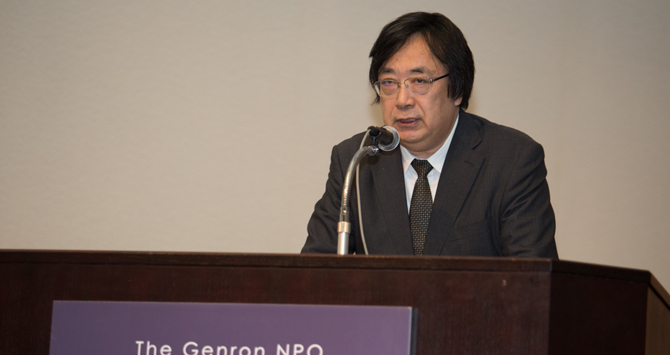
Yoriko Kawaguchi, a fellow at the Meiji Institute for Global Affairs and former Minister of Foreign Affairs and Minister of the Environment, was invited to deliver the keynote address in Session 1.
Kawaguchi began by asking the speakers to consider the core issues causing anxiety in the world, to identify short-term and long-term phenomena, and also determine which issues will have a fundamental impact. As an example, she used economist Branko Milanovic's famous Elephant Chart to point out that while there is increased disparity in industrialized countries - which she said may have had an effect on the election of Donald Trump in 2016 - research has shown that middle-class incomes in developing countries continue to grow.
Referring to the theme of Session 1, Kawaguchi state that a definition of the term "liberal world order" may be necessary. Does it refer to the international structure, or does it refer to the values that structure was built upon? In addition, in the interests of maintaining that order, is it acceptable for nations to impose those values on other nations?
As we answer these questions, Kawaguchi believes, we must decide whether to modify the current order or, if it is determined that the current model is no longer viable, come up with something completely new. What kind of world order will embrace and deal with the increased diversity of international society, with the advancements in technology, and proliferation of non-state actors such as NGOs and even terrorist organizations?
She pointed to China's status as a fledgling superpower and India's continued growth, and to forecasts predicting that more than 50% of global GDP growth will be in developing countries. All of which are reasons to encourage us to "reconsider the role of the G-7, and reconsider the current philosophy of having major powers lead other countries."
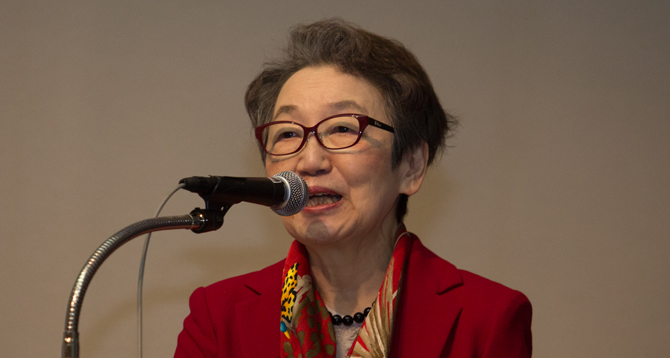
Session 1 Discussion
James Goldgeier, a Visiting Senior Fellow in the Council on Foreign Relations in the U.S.A.,began the discussion with a reminder of the original reasons the international order was founded: to eliminate economic protectionism and virulent nationalism, two causes of the Great Depression and the Second World War. That original goal seems to stand in contrast to the goals of the current U.S. administration, with Donald Trump promoting protectionism and nationalism, both at home and in Europe.
"The liberal order needs rules, and Trump hates rules," Goldgeier said, adding that Trump has "shown resentment of allies" because they have benefited from US security. He pointed out some other changes that have occurred, i.e. that the Republican Party used to be sceptical about Russia and promote free trade, but now they spend much of their time defending Trump, and the Democrats support free trade more.
There is good news, however, Goldgeier said.
"The U.S. public and establishment support rule-based order...although there is a large gap between the urban majority that has benefited from it, and the rural minority that has been taken advantage of."
John Nilsson-Wright is a Senior Research Fellow at Chatham House in the United Kingdom, and he stated that the threat from North Korea goes beyond its nuclear arsenal; U.S. allies South Korea and Japan are now concerned about what their alliances entail.
"They fear they will either be abandoned by the US, or trapped by their alliances in wars they wish to avoid," he noted.
He also referred to the 1989 essay "The End of History?" by political scientist Francis Fukuyama, who claimed that the world was witnessing "the universalization of Western liberal democracy as the final form of human government." According to Nilsson-Wright, however, that claim has not panned out in recent years with the emergence of populist politics, and "emotion-based" thinking driven by leaders.
"Those leaders need to fill the power vacuum left by the U.S. retreat from the international system," he said, and they need to challenge the US. Countries also need to focus on the importance of identity politics and multilateral cooperation, and recognize how valuable our existing institutions are.
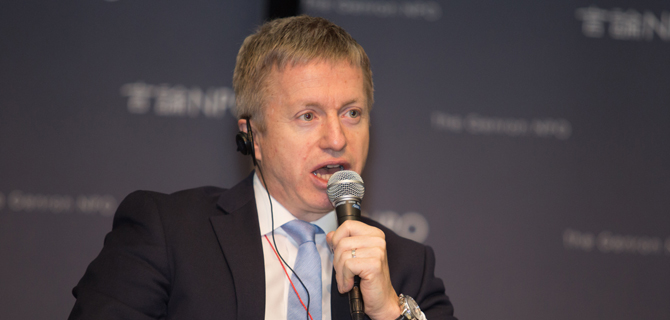
Thomas Gomart is Director of the French Institute of International Relations, and he emphasized the need for cohesion within the G-7, even with the uncertain trajectories of the U.S., the U.K. and Italy.
Gomart pointed to the French white paper published in October 2017 that showed the French government had identified three countries as simultaneously weakening multilateralism: Russia for its veto behaviour in the U.N.; China for its aggressive policies in the South China Sea; and for the first time, the U.S. for its withdrawal from the Paris Agreement and UNESCO, and its decision to cancel the TPP.
In such an environment, Gomart believes that the middle powers need to defend multilateralism and limit the damage caused by the big three.
Regarding geopolitical instability, Gomart recognized that the North Korea issue is felt particularly palpably in Asia, but that it is a concern for all. The situation in Iran is related, and while it is a critical issue, Gomart believes the G-7 should also look at the situation in Syria as equally critical. It is "not only a humanitarian disaster, but a proxy war for stability in the Middle East, and an ongoing fight between Iran, Saudi Arabia, and their systems of alliances."
Gitta Lauster is Special Assistant to the Director at the German Institute for International Security Affairs, and she pointed to social media's role in destabilizing the world order.
The internet was once considered inclusive, she said, pointing to the Arab Spring and to protests in Iran, Turkey and Hong Kong as examples of it "empowering marginalized groups and (giving) them a voice"
However, social media has now become a weapon used to attack to the core of the liberal order, and Lauster believes it played a role in bringing the populist Alternative für Deutschland party 12.5% of the vote in Germany's most recent elections.
Lauster stated that similar social media campaigns may have had an effect on the elections in the U.S. and Russia - and on the Brexit vote - and she stated that this sort of negative use of social media destabilizes democracies and the liberal world order.
"Governments have to face this challenge," she said, and noted that the internet has challenged some of the idea presented in Fukuyama's thesis. Governments need to reach people who are less informed, Lauster believes, through a means as available as social media.

Carlos Ivan Simonsen Leal serves as President of Brazil's Getulio Vargas Foundation, and he stated that the Elephant Chart is neither the problem nor its cause, but rather "a consequence of the problem."
According to Leal, the issue lies in fiscal stability, and the mechanisms of that are not fully understood. What is known is that with no fiscal stability, markets become less predictable and result in less leverage. More importantly perhaps, "There are no liberal democracies if they are no markets; no markets - no leverage."
Leal lamented that, "We don't understand the importance of fiscal stability - we only look at national competition."
Leal also noted that the Elephant Chart used by Kawaguchi only presented data up to 2008, but he noted that this was the time of the banking crisis, after which the developing countries fared much better. He pointed to the 1995 banking crisis in Brazil, and the harsh rules laid in place afterwards. Leal believes that those rules are what ensured that Brazil's credit wouldn't recede and the country would continue to expand its disposal income, while many other countries were suffering the effects of the 2008 banking crisis.

Xiaohong Chen is former Director General of the PRC State Council's Development Research Center, and he stated that after the past 40 years of significant growth, China needs to continue to develop itself and make a greater contribution to the world.
Chen noted that the country's goals were laid out last year during the 19th National Congress of the Communist Party of China. Those goals included the establishment of a commercial industrial society that benefits every citizen equally, and further development of issues that include the environment - only a recent addition to the agenda.
Chen said that China must still deal with the risk of an economic bubble, and its goal to bring more than 70 million above the poverty line. He also noted that while many pollutants have been eliminated, and PM 2.5 levels have decreased by as much as 35% in some regions, national ecological goals have still not been reached.
With increased global interdependence, Chen believes that no one nation is capable of resolving the issues on its own. Interconnecting national systems will lead to worldwide economic growth, he said, and he expressed his hope that with China joining the international community, a set of rules beneficial to all will become possible.
Ettore Greco, Executive Vice President of Italy's Institute of International Affairs, pointed to three items needed to make the international system more robust. Nations must reiterate their commitment to respecting the rules of the order.
"Sometimes we are selective (about which rules to follow)", he said. "And some counties are more selective than others."
In addition, Greco thinks that countries should declare their willingness to reform the system.
"The possibility of assuring the continuation of the system lies in the capacity to reform it and give it greater legitimacy," he said, and this can be achieved through discussions with rising powers.
Finally, we should defend and consolidate the system's strengths, in particular enforcement mechanisms such as the dispute settlement mechanism within the WTO.
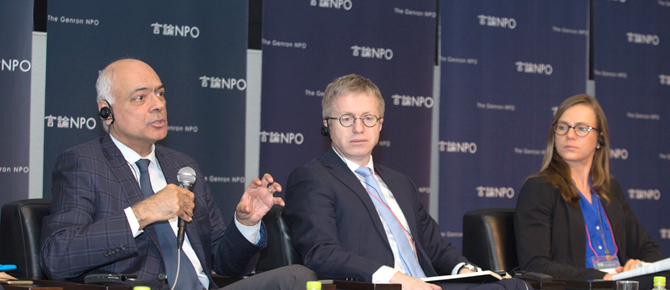
Rohinton Medhora is the President of the Centre for International Governance Innovation in Canada, and he reiterated Greco's point about effective solutions that are already in place.
"We have solutions out there that have worked," he said. "And we're going out of our way to say they didn't work and make them not work. The WTO's dispute system was rules-based, and the US has used it and done well. But now it is being starved of new appointments and is withering away."
However, Medhora also pointed out that the mechanism itself will still remain, and it can be utilized "once that cycle of scepticism is behind us."
Medhora also believes that summits are an effective weapon in the arsenal of the international community. While the "G20 is adrift", he believes that it doesn't get enough credit for its successes, pointing out that after the crisis of 2007 and 2008, "we could have gone into a tailspin...and ended up in a trade war, but the countries there chose not to."
Chairman Sunjoy Joshi of the Observer Research Foundation in India has a more positive view of the current state of democracy in the world. He believes that part of the problem is in perspective - many of the Western democracies are not used to the more raucous expression of democracy currently being experienced, whereas that is the status quo in India.
"India has a fractious democracy: always boxing, never a tango," he said. "The problem with the (West) is that it was always a tango."
Democracies always calm and collected, Joshi believes, but they always find a way. That way is through elections, he said, and pointed to Trump as an potential future example of this mechanism in action.
"For Trump, everything is TV. You can win an election on ratings, but you can't hold power on that. You have to deliver. We go through the cycle of change. Eventually, you have to go to ground and build up."
Joshi also took issue with some of the solutions being posed by other speakers on the stage, calling them "illiberal." He clarified this by saying that we should not blame things like social media for the problems we face.
"When you start hankering after the power of the elite to control the narrative, you are making a mistake," he warned.
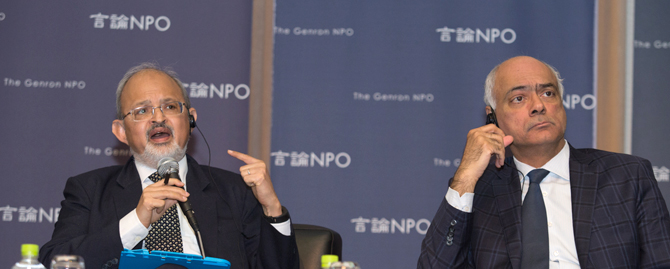
Keng Yong Ong serves as Executive Deputy Chairman at the S. Rajaratnam School of International Studies in Singapore. Ong's point dealt with the development of technology and how its intrusion into our daily lives has fundamentally changed how countries coexist with each other.
Ong believes that it is important for us to find a way to "reconsolidate how we relate to technology" as we move forward. Work and the nature of employment will continue to transform, and this is an issue that must be considered by national leaders - however no "serious leaders" have looked at this problem thus far.
"I agree with Ms. Kawaguchi," he said. "We need leaders. There will always be a need for someone to be the referee, and have the authority to do the things (that are needed)."
Thomas Gomart continued on the theme of employment, pointing out that national spending is based upon the tax revenue levied on workers, and that revenue is what funds social spending. With the evolution of employment, work becomes more fragmented and social spending decreases.
He admitted that it is difficult to address the issues caused by such circumstances, but mentioned that the idea of a universal income is one that arose in the previous French presidential election.
"I think it's worth thinking about that," he said. "The fewer salaried workers you have, the more problems you have in sustaining a welfare state as it is in the E.U."

In Gomart's opinion, universal income might address some of the problems.
Rohinton noted that while the G7 and G20 don't tend to harmonize on issues, Argentina selected work as the focus of the G20 summit, as did Canada for the G7 summit. He said that pessimistic models predict the loss or transformation of 50% to 60% of jobs, and we don't know who will gain from these changing circumstances. However, Rohinton explained, every technological advance thus far has resulted in increased income, and we can act to make good things happen.
"Universal income, training...if we get them right, we don't have to just accept technological change, we can shape it," he said.
Ong pointed to educational reform and regulation of migration flows as important issues to be addressed by technology. One way to slow the migration of populations developing centers into developed ones is to remove the attraction of such moves, Ong explained. If production regions can be moved to developing areas, there will less pressure on the developed world to integrate immigrant populations.
Kudo asked the participants if they had any suggestions on what can be done to protect democracy in the world, and Gomart responded with a question of his own.
"Is education a private good where you must pay, or is it a public good where it's provided for free?" he asked. Gomart believes that the G-7 countries would all offer vastly different answers, and for Gomart, how one answers depends on whether one wishes to "prepare future consumers or cultivate future citizens."
Ettore Greco suggested that the G-7 should shift from its goals of productivity and flexibility to focus on a broader agenda that includes measures to protect people left behind by the impact of globalization. This should also include reforming the system to cope with the innovation impact of technology.
Sunjoy Joshi reminded the audience however that the label "democracy" hides much behind it. With populist democracy rising through the efforts of leaders playing on people's fears and anxieties, he said, "What we need to protect is pluralism. How do we protect plural democracy? The heterogeneity of society must be protected everywhere."
Gitta Lauster noted that policy fields are no longer as isolated as they once were, with issues like the migration crisis touching on international and regional security, but also on domestic policy.
Leal mentioned that one reason democracy is being challenged everywhere is because of the pressure of time. Quick responses are required for urgent problems, but that provides executive branches with the excuse to increase their own powers as legislative powers shrink. That means you are increasing unpredictability.
"No one wants to make the difficult choices between the short-term and long-term," he emphasized. "Everyone is betting on innovation. It's part of it, but it's not everything."
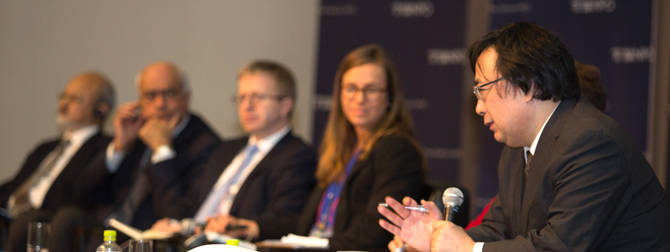
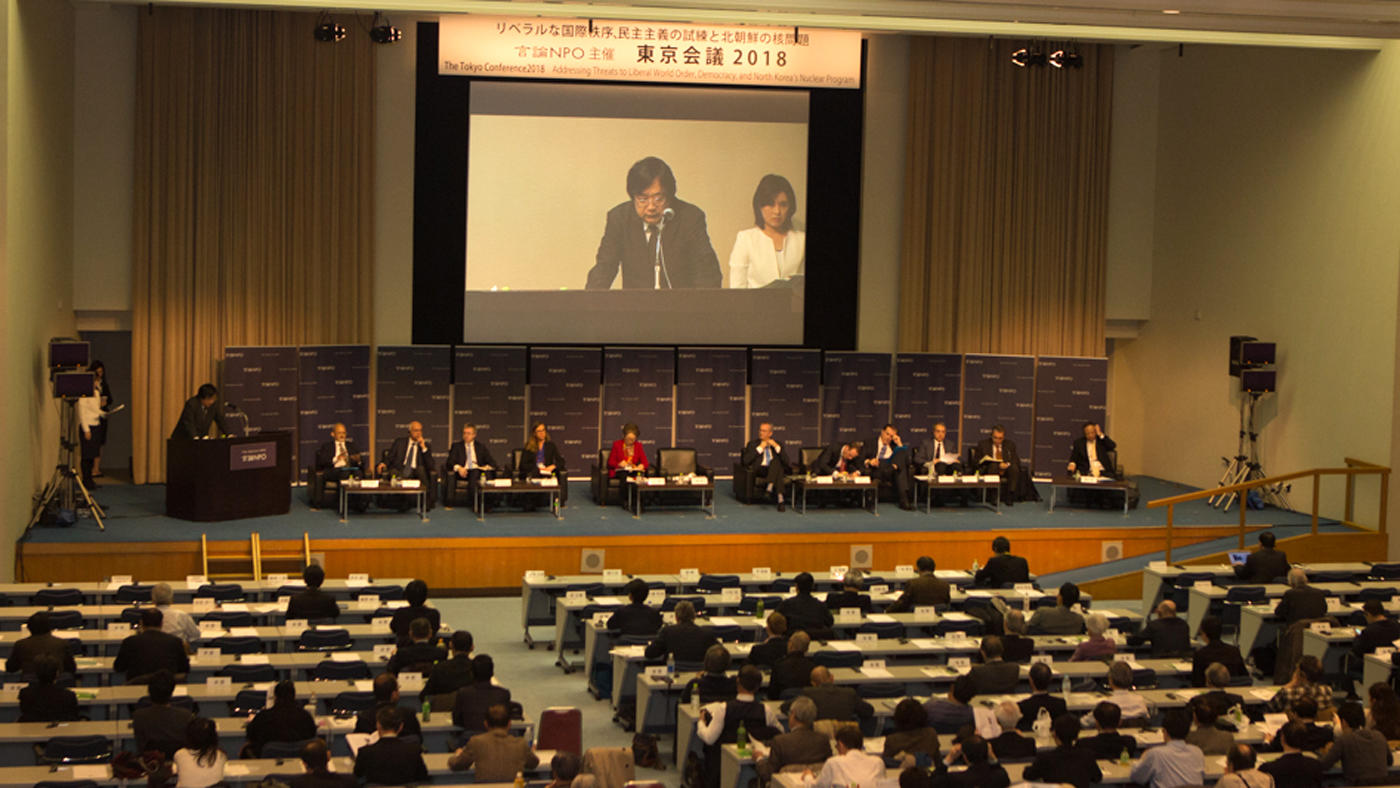
Post a comment